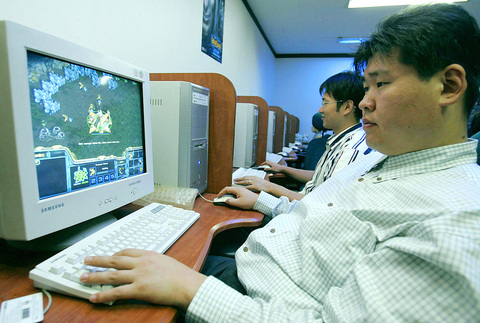Keyboard and mouse in hand, he battled until nearly his last breath.
The death of Lee, a 28-year-old man identified only by his last name who passed away early last month after nearly 50 straight hours of playing online computer games, has South Korea concerned about the health of the millions of gamers in the world's most wired country.
Many of South Korea's 17 million gamers regularly stroll into Internet cafes, the 1,000 won-per-hour (US$1) hangout popular among young South Koreans, and camp out in front of monitors to play for hours -- and even sometimes days or longer.

PHOTO: AP
"I've seen people who play games for months, just briefly going home for a change of clothing, taking care of all their eating and sleeping here," said Jun Mung-gyu, 27, who runs an Internet cafe in southeastern Seoul.
More than 70 percent of South Korea's population of 48 million uses the Internet, and the country has the highest per-capita rate of broadband connections in the world. With all that access has come the rising problem of Internet addiction.
The number of counseling sessions for game addiction quadrupled last year from the previous year, a government agency said last week. There were 8,978 cases of counseling for game addition last year, compared with 2,243 cases in 2003, according to data released by the Korea Agency for Digital Opportunity and Promotion.
This year, there have already been 7,649 counseling sessions in the first seven months.
"The rise is mostly due to increased awareness of game addiction," said agency official Jang Woo-min. "More people are becoming aware of the importance of healthy and productive usage of computers."
Gamers camped out at Internet cafes typically live on instant cup noodles and cigarettes, barely sleeping and seldom washing. Lee wasn't the first to die of such causes in this game-crazed nation: In 2002, a man expired in Kwangju after 86 hours of marathon gaming, among others.
Lee collapsed Aug. 5 in Daegu after having eaten minimally and not sleeping, and died a few hours after being transported to a hospital. Doctors presume Lee died of heart failure, although no autopsy was performed.
Internet cafe proprietor Jun himself isn't far removed from his game-addict days. Just a year ago, Jun found himself playing up to 15 hours of online role-playing games a day, which gave him constant headaches and cramps in his neck and shoulders.
"You have no life, you only focus on gaming, putting off all things like getting a haircut," recalled Jun, who said he felt obligated to return to the games every morning when he woke up.
Jun eventually was able to pull himself out of the addiction a few months ago as work began to occupy more of his time. That wasn't the case for the deceased gamer Lee, whose addiction led him to often miss work and got him fired from his job.
Physicians working with professional e-sports teams recommend gamers rest 10 minutes with their eyes closed after every five matches, and never play in the same posture for more than two hours.

POWERING UP: PSUs for AI servers made up about 50% of Delta’s total server PSU revenue during the first three quarters of last year, the company said Power supply and electronic components maker Delta Electronics Inc (台達電) reported record-high revenue of NT$161.61 billion (US$5.11 billion) for last quarter and said it remains positive about this quarter. Last quarter’s figure was up 7.6 percent from the previous quarter and 41.51 percent higher than a year earlier, and largely in line with Yuanta Securities Investment Consulting Co’s (元大投顧) forecast of NT$160 billion. Delta’s annual revenue last year rose 31.76 percent year-on-year to NT$554.89 billion, also a record high for the company. Its strong performance reflected continued demand for high-performance power solutions and advanced liquid-cooling products used in artificial intelligence (AI) data centers,

SIZE MATTERS: TSMC started phasing out 8-inch wafer production last year, while Samsung is more aggressively retiring 8-inch capacity, TrendForce said Chipmakers are expected to raise prices of 8-inch wafers by up to 20 percent this year on concern over supply constraints as major contract chipmakers Taiwan Semiconductor Manufacturing Co (TSMC, 台積電) and Samsung Electronics Co gradually retire less advanced wafer capacity, TrendForce Corp (集邦科技) said yesterday. It is the first significant across-the-board price hike since a global semiconductor correction in 2023, the Taipei-based market researcher said in a report. Global 8-inch wafer capacity slid 0.3 percent year-on-year last year, although 8-inch wafer prices still hovered at relatively stable levels throughout the year, TrendForce said. The downward trend is expected to continue this year,

Vincent Wei led fellow Singaporean farmers around an empty Malaysian plot, laying out plans for a greenhouse and rows of leafy vegetables. What he pitched was not just space for crops, but a lifeline for growers struggling to make ends meet in a city-state with high prices and little vacant land. The future agriculture hub is part of a joint special economic zone launched last year by the two neighbors, expected to cost US$123 million and produce 10,000 tonnes of fresh produce annually. It is attracting Singaporean farmers with promises of cheaper land, labor and energy just over the border.

US actor Matthew McConaughey has filed recordings of his image and voice with US patent authorities to protect them from unauthorized usage by artificial intelligence (AI) platforms, a representative said earlier this week. Several video clips and audio recordings were registered by the commercial arm of the Just Keep Livin’ Foundation, a non-profit created by the Oscar-winning actor and his wife, Camila, according to the US Patent and Trademark Office database. Many artists are increasingly concerned about the uncontrolled use of their image via generative AI since the rollout of ChatGPT and other AI-powered tools. Several US states have adopted